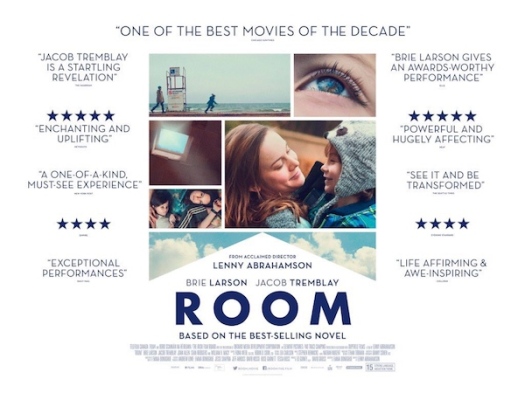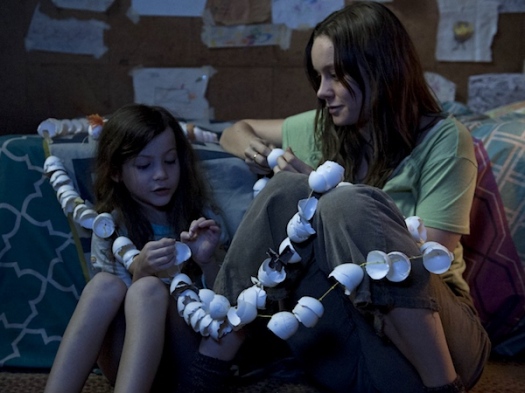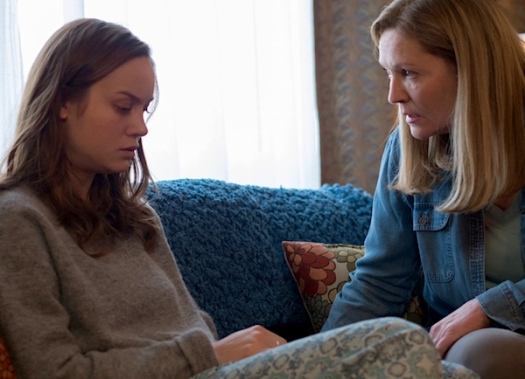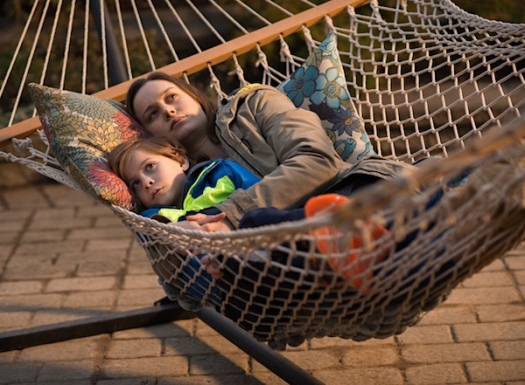Lenny Abrahamson | 118 mins | streaming (HD) | 2.35:1 | Ireland, Canada & UK / English | 15 / R

 2016 Academy Awards
2016 Academy Awards4 nominations — 1 win
Nominated: Best Picture, Best Director, Best Adapted Screenplay.
Inspired by the infamous Josef Fritzl case (but most decidedly not a a direct fictionalise thereof), Room is a drama about a horrific crime — at times it could even be said to be a crime thriller — but it’s not interested in dealing with the usual outcomes of such filmic narratives; namely, justice or revenge (or both). Rather, it has a goal both more realistic and humane: it’s about the victims, and the psychological toll the crime exerts upon them.
It’s told primarily from the point of view of Jack (Jacob Tremblay), a five-year-old boy whose entire world is Room, the small space he lives in with his mother, Ma (Brie Larson). What Jack doesn’t understand, but is quickly obvious to the viewer, is that they’re being held captive by ‘Old Nick’ (Sean Bridgers), who visits nightly for… well, you can guess what for. Ma has tried to keep Jack sheltered from the reality of their situation, not telling him properly about the outside world — until one day she hatches a plan for their escape.
Which possibly makes Room sound more action-packed than it is. There’s a sequence of edge-of-your-seat tension in the middle of the film, when Jack and Ma execute their plan, but otherwise this is a very grounded movie. Obviously the situation the characters have found themselves in is pretty extraordinary, but we know these things happen (Fritzl is, sadly, not the only example), and Room is committed to being a plausible exploration of such cases rather than an adrenaline-fuelled Movie version.

This is a spoiler, really, but it’s also vital to understanding the film’s point and focus: that escape attempt, which occurs more-or-less exactly halfway through the movie, is a success. After seeing the existence Jack and Ma endured inside Room for the first half, the second is about how they adjust and cope to being in the real world after their ordeal. This half-time switch-up is the film’s primary strength. A comment I read online taps into why that’s the case: “At the beginning it was great. I thought it was gonna be a claustrophobic thriller/horror film following the line of others like Cube, Panic Room or even Das Boot… I got the feeling that if they would had escaped later on, the film would have been better.” This person is, of course, wrong, and their own comment demonstrates why. Sure, you could make this kind of story into “a claustrophobic thriller/horror film”, but that would be a genre B-movie and nowhere near the psychological realism (and, by extension, respect for real-life victims of such crimes) that Room is clearly interested in. I have to reluctantly agree that the first half is the more gripping and involving, but the second half — the having to cope with the psychological fallout once their ordeal is over, a very real but much less-seen aspect of crime — is where the meat and heart of Room lies. Or wants to.
The thing is, is it the case that the characters’ situation is inherently emotional, and therefore it’s pretty hard for a film about it to not elicit strong responses, rather than that this film in and of itself is doing anything particularly special? Some would give that an emphatic “yes” — criticism of Lenny Abrahamson’s plain direction abounds. I think that does him a disservice. This is not a showy movie, but nor should it be. Saying it’s no better than a cheap cable TV movie shows a lack of understanding for the quality of being understated, and the difference between that and thoughtless point-and-shoot quickie filmmaking. Indeed, the wiseness of the filmmakers in not giving the story an overly histrionic treatment is one of its biggest assets.

Another is the performances. Larson is excellent, full of subtleties even when called on to enact more obvious Dramatic Moments. Ma runs the emotional gamut throughout the movie and Larson negotiates every changing facet with believability. Tremblay isn’t half bad either. I stop short of bigger praise for him because, frankly, I found his character pretty irritating at times, but that might be part of the point so maybe I’m being unfair. While those two are the natural focus, there are effective supporting turns from the likes of Joan Allen as Ma’s mom and Tom McCamus as her new partner, who gets one of the best scenes.
Despite these qualities, I was left wondering how much it had dug into Jack and Ma’s psychology, really? The decision to focus on the kid keeps us removed from Ma at some key points, giving us a snapshot of how she’s been affected rather than a detailed portrait. But we never fully get the psychology of Jack either. On the one hand that’s because, well, he’s only five years old; and on the other it’s because he’s lived his entire life in a situation we can only try to imagine — it’s hard to connect with his very unique worldview. That’s not to say the film fails entirely — there are moments, even whole scenes, where we’re able to access some level of understanding for what these characters have experienced — but as for the totality of it? Well, as I said, it’d be hard for the film to not generate sympathy just given the pure facts of the story it tells, but in terms of going further than that, I just felt there was something missing.

Make no mistake, Room is a very good, very affecting film, powered by two strong lead performances, but at the end I felt there was more left to understand about these characters and their experiences.

The UK network premiere of Room is on Channel 4 tonight at 9pm.
It was viewed as part of my What Do You Mean You Haven’t Seen…? 2017 project, which you can read more about here.

Shit was ass – kimmy
LikeLike